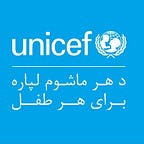Combatting malnutrition in the hospital and the home
By Nicole Foster with reporting by Sohaila Khaliqyar
KABUL, Afghanistan, June 22 2016 — Five-months old Faeeza started struggling with malnutrition before she could even giggle or laugh.
“She was four months and 25 days old when we came to the hospital and we have been here for five days,” said Raeesa, 25, Faeeza’s mother.
Severe acute malnutrition is a life-threatening illness. At any given moment in Afghanistan, 4 per cent of children are severely acutely malnourished and in need of therapeutic food and nutritional support to help them survive.
Baby Faeeza is one of the lucky ones. She has recovered and weighs a healthy 6,5 kilograms after receiving in-patient care at the UNICEF-supported Indira Ghandi hospital in Kabul, where she was fed with therapeutic milk eight times a day for five days.
UNICEF, with support from the Government of Japan, works with the Afghan government to provide supplies for in- and out-patient care for the management of severe acute malnutrition. This includes community outreach and services in community-based health centres across Afghanistan.
Malnutrition: A life-threatening illness
Malnutrition is a complex condition that involves multiple and overlapping deficiencies of essential nutrients. The causes of malnutrition include insufficient access to food, poor health services, lack of access to safe water and sanitation, and inadequate child and maternal care.
Severe acute malnutrition is the most extreme and visible form of undernutrition. Its face is a child — frail and skeletal — who requires urgent treatment to survive. It is a major cause of death in children under the age of five but while it is the direct result of malnutrition itself, it is also caused by childhood illnesses like diarrhoea and pneumonia that malnourished children are too weak to survive.
Ongoing conflict and harmful social norms aggravate the situation as too many Afghan girls and mothers remain uneducated. This has a direct impact on their knowledge and practices of essential nutrition, as well as their ability to make the right choices for their newborns.
“My family did not let me to go to school because I was a girl,” says Raeesa. “I did not know how important it is to eat well. I was not able to produce breast milk.”
But when the family struggles to make ends meet, it is hard to provide balanced and nutritious meals.
The lack of awareness about the importance of exclusive breastfeeding in the first six months of life and the absence of essential hygienic practices at the household level are key factors that continue to contribute to child malnutrition in Afghanistan.
“I have three sisters-in-law who are in school. They give me advice about how to care for my children, especially about washing my hands before feeding my children or eating, and before cleaning the baby,” says Raeesa.
Continuing care in the home
Treating severe acute malnutrition requires a continuum of care beyond the hospital, in the home and at the community level.
Ready-to-use therapeutic food (RUTF) — an energy-dense, micronutrient enhanced peanut-based paste — is an effective way for children who suffer from severe acute malnutrition to continue receiving a nutritious food intake once they are released from the hospital or health centre.
Eight-month old Khadija, another baby girl struggling with severe acute malnutrition for two months, has also been visiting the Indira Ghandi hospital in Kabul to receive treatment, therapeutic milk and supplements. The RUTF supplements have been essential alongside her visits to the hospital, though she has suffered numerous setbacks, including contracting measles, which have delayed her recovery.
The food packets provide all the nutrients needed for recovery. They have a good shelf life and do not spoil easily after opening. The risk of bacterial growth is very limited and they are safe to use without refrigeration in the home without close medical supervision. They can also be used in combination with breastfeeding.
And, importantly, children like the nutty flavour.
“Khadija loves the food packets [RUTF]. Sometimes, she likes them more than any other food I prepare for her,” says Rukhma, Khadija’s mother.
With support from the Government of Japan, UNICEF procured ready-to-use therapeutic food and therapeutic milk to treat approximately 8,100 under-five children suffering from severe acute malnutrition in 2015 in Afghanistan.
